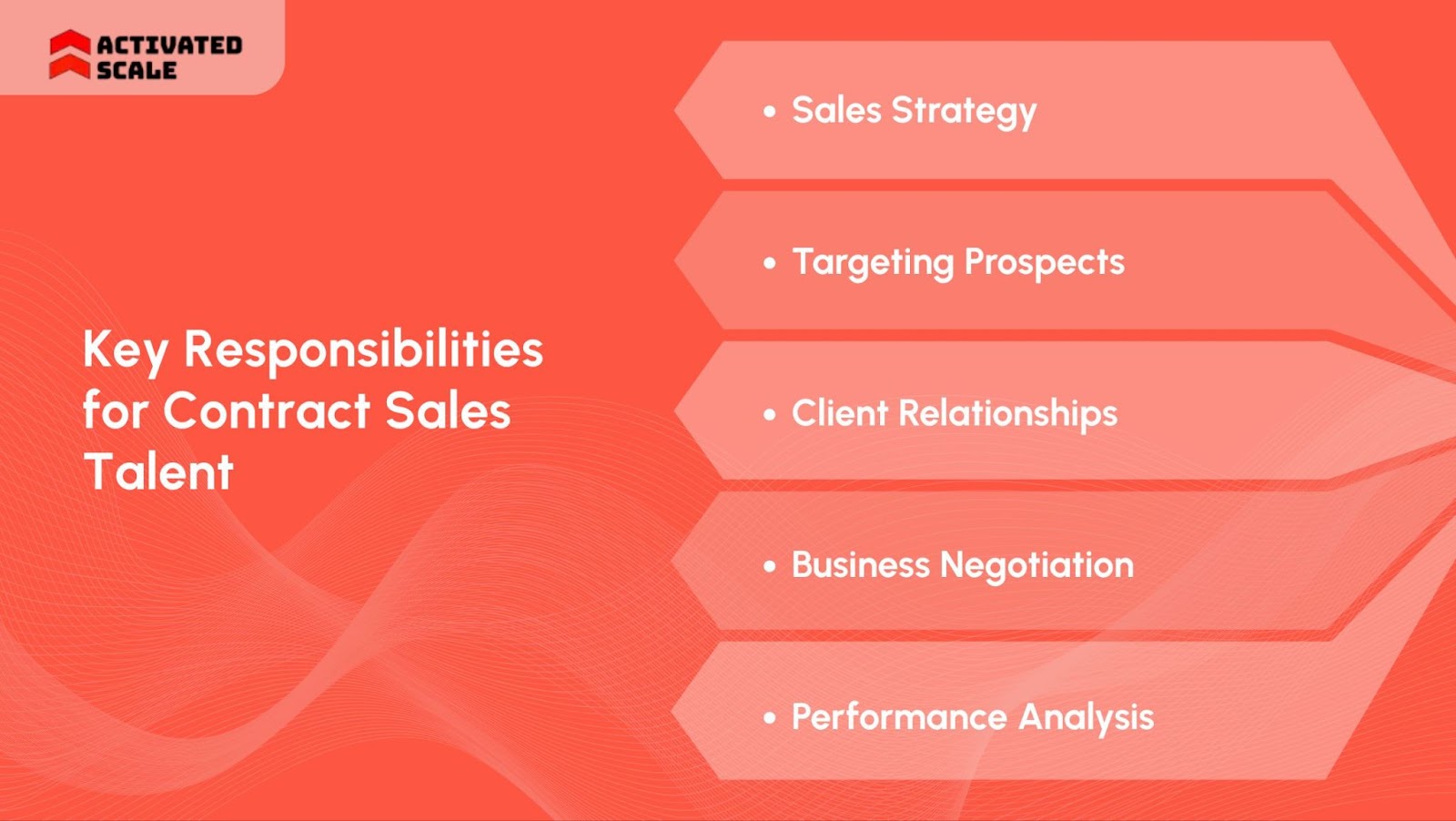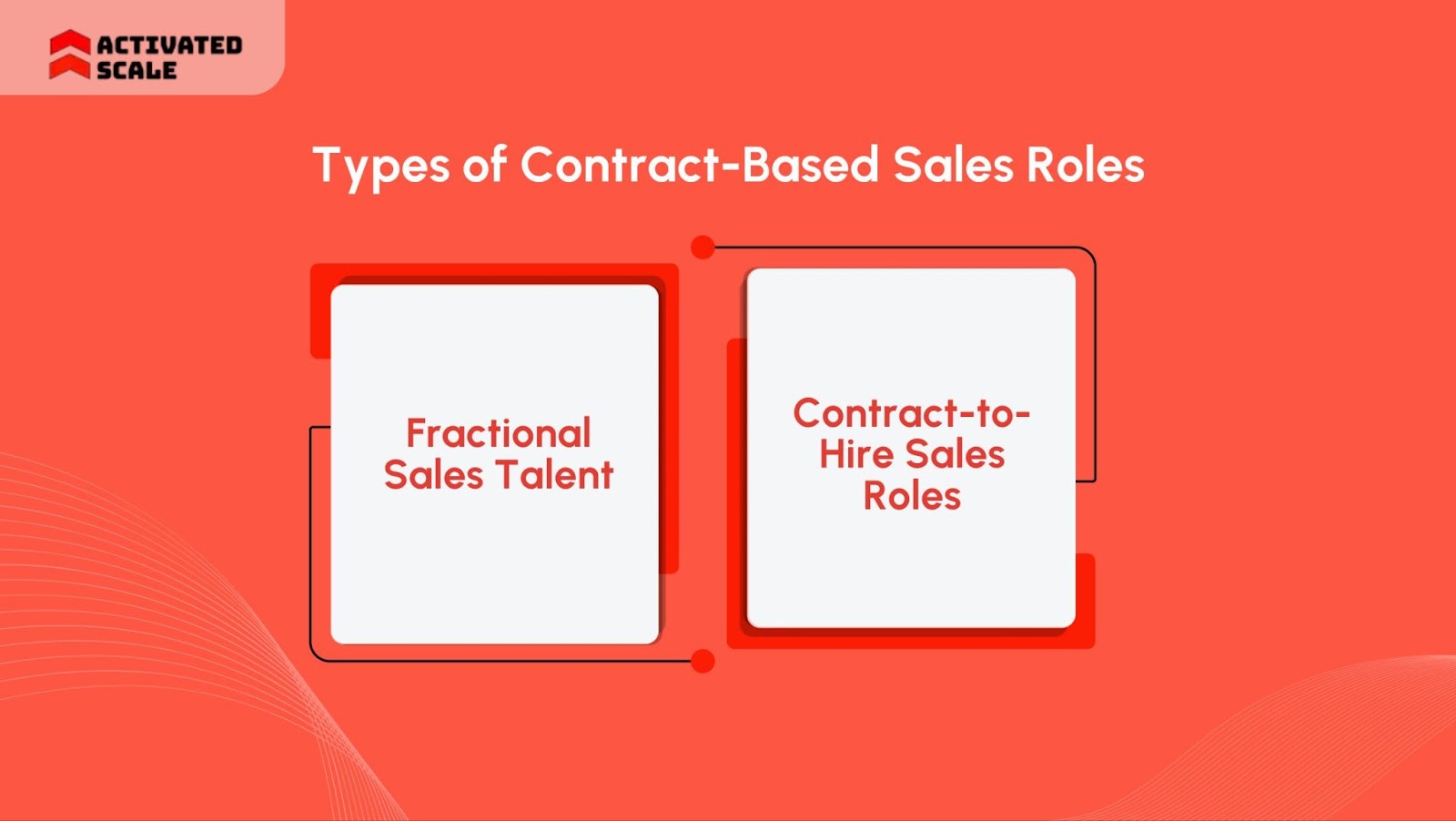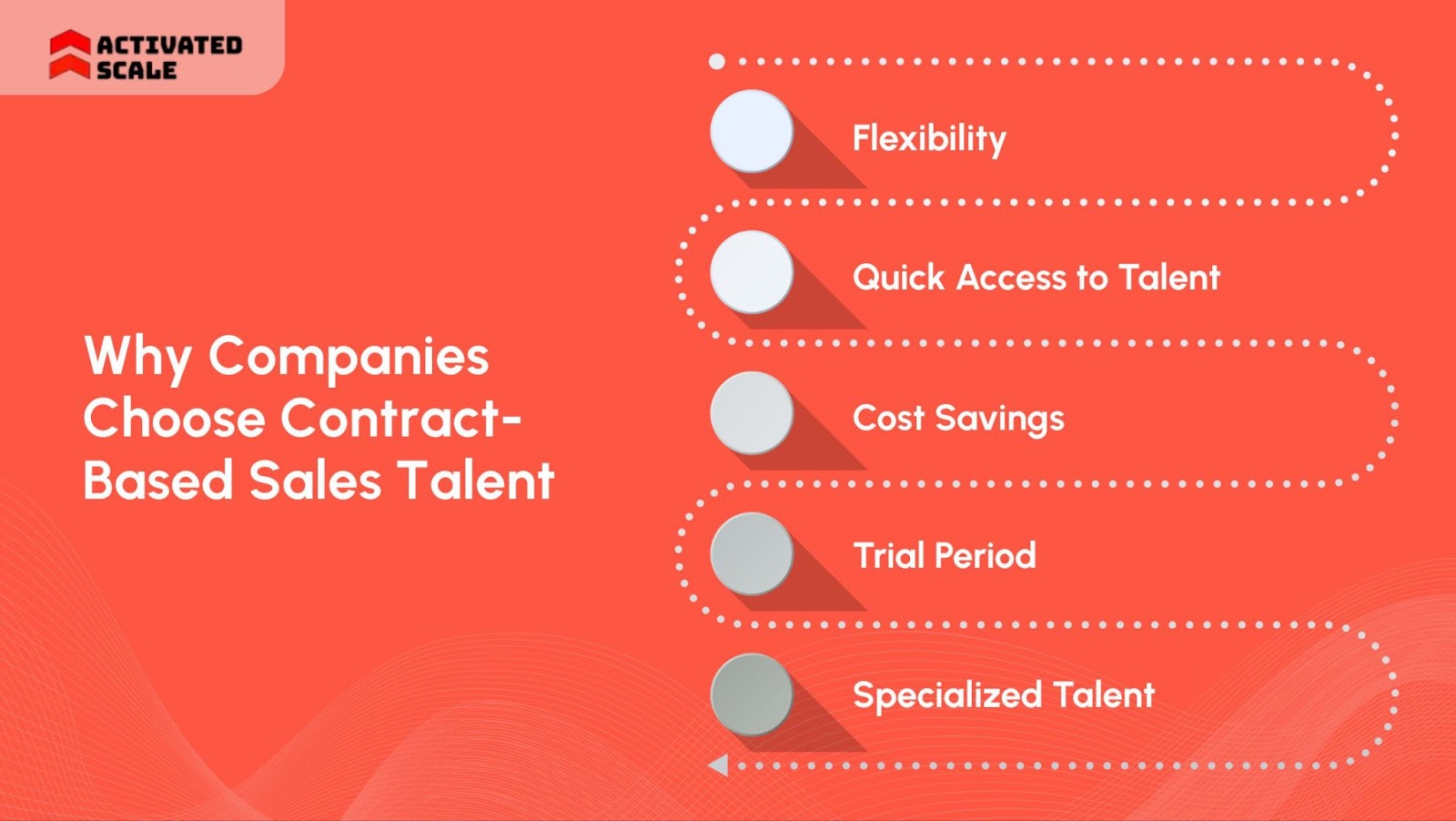Do you often associate scaling your sales team with taking big risks, or waiting months for results? You are definitely not the only one! Scaling a sales team can be overwhelming, especially when traditional full-time hiring comes with high costs and risk.
In fact, 49% of hiring managers say finding the right fit is harder than ever. With the average sales role now taking over 44 days to fill, while carrying a staggering 35% annual turnover rate, the margin for error is razor-thin.
That’s where contract-based sales talent comes in, not as a trend, but as a reliable workforce to scale your business. By 2027, contract and freelance workers will make up 50% of the workforce.
In this blog, we'll explore how contract-based sales talent drives faster growth with less risk and overhead.
Key Summary (TL;DR)
- Contract Sales Talent Accelerates Growth: Contract-based sales talents help companies quickly fill gaps and seize opportunities without long-term commitments, enabling faster revenue generation.
- De-Risk Hiring with Contract-to-Hire: This model allows you to evaluate real job performance and cultural fit before making full-time offers, minimizing costly hiring mistakes.
- Activated Scale Simplifies Contract-Based Sales Hiring: Activated Scale provides pre-vetted, US-based sales talent and manages sourcing, onboarding, and ongoing support for a seamless experience.
- Agility and Performance Drive Results: Using contract sales talent lets businesses scale flexibly, hold reps accountable with clear KPIs, and focus on sustained, scalable sales growth.
What Is Contract-Based Sales Talent?
Contract-based sales talent refers to sales professionals hired for a clearly defined term, project, or strategic need rather than a permanent, full-time role. These experts step in to build pipelines, close deals, or launch campaigns, with their contracts setting clear expectations for timelines, targets, and deliverables.
Companies, especially startups or fast-growing teams use contract sales talent when they want skilled results, speed, and flexibility, without locking into long-term employment.
Key Responsibilities for Contract Sales Talent

- Designing and executing sales strategies to hit specific goals
- Identifying and targeting high-value prospects
- Building and nurturing key client relationships
- Negotiating and closing new business
- Reporting and analyzing results to optimize performance
How Contract-Based Sales Talent Differs from Full-Time Hiring
Let’s understand the key differences between contract-based sales talent and full-time hires. The decision impacts not only your budget but also your ability to stay agile and responsive to market needs.
Here's a breakdown of how these two models compare:
Types of Contract-Based Sales Roles

There are primarily two types of contract-based sales roles. Each one offers a unique advantage depending on your immediate needs, be it flexibility, specialized skills, or a risk-free trial period before committing.
- Fractional/Interim Sales Talent
Fractional sales professionals are hired for short-term engagements to fill specific gaps in the sales process.
This might include covering for a sales leader on leave, handling a sudden uptick in leads, or temporarily filling positions during busy seasons. These roles are ideal for situations where a business needs expertise for a limited period without the need for permanent hires.
- Contract-to-Hire Sales Roles
Contract-to-hire roles are designed as a trial period where the company and the employee both assess if the partnership is a good fit.
After a defined contract period (often 3-6 months), there’s an option to convert the role into a permanent, full-time position based on performance and compatibility. This model reduces the risk of making a permanent hire that may not align with the company’s needs or culture.
If you’re looking to explore contract-based talent further, platforms like Activated Scale can help connect you with pre-vetted professionals who fit your specific sales goals.
Also Read: Top 10 Sales Prospecting Tools to Supercharge Your B2B Pipeline in 2025
Why Companies Choose Contract-Based Sales Talent

Contract-based sales talent offers a strategic advantage for companies looking to scale quickly while minimizing risk. Here's why more companies are turning to this model to drive growth efficiently.
A. Flexibility & Adaptability
In sales, agility is often the difference between growth and stagnation. Contract-based sales talent allows businesses to adjust their team structure quickly based on immediate needs, such as:
- New product launches
- Market testing
- Seasonal demand surges
This flexibility means companies can scale fast and adapt without the typical commitment of hiring full-time staff. This model lets you align your sales team with real-time business priorities, whether you need an extra pair of hands for a short-term project or a larger team for a product rollout.
B. Faster Access to Skilled Talent
Time-to-market is critical when seizing opportunities. With contract-based sales talent, businesses can avoid lengthy hiring processes and quickly bring in experienced salespeople.
- Pre-vetted talent means no wasted time sifting through resumes.
- Immediate availability ensures you can fill roles in days, not weeks.
This leads to faster decision-making and accelerated growth, as the right sales professionals are already equipped to hit the ground running. In a market where every day counts, this quick access to talent gives you the edge over competitors still stuck in the hiring pipeline.
C. Cost Efficiency
For growing businesses, budget efficiency is key to long-term sustainability. Hiring full-time employees includes not only salaries but also benefits, training, and other overhead costs.
- Contract-based roles allow companies to pay only for the specific expertise they need, whether it’s for a 3-month project or a seasonal spike in demand.
- No commitment to full-time salaries, pensions, or health benefits reduces overall operational costs.
According to recent studies, bad hires can cost companies up to 30% of the employee's first-year salary. This includes recruitment costs, training, lost productivity, and the potential disruption to team dynamics.
To get a clearer idea of the costs, use Sales Hire Cost Calculator to calculate exactly how much a wrong hire could cost your business.
D. Opportunity to “Try Before You Buy
Hiring decisions in sales are high stakes; one wrong choice can cost your business more than just time. With contract-to-hire talent, companies mitigate hiring risks by assessing a candidate’s fit before offering a permanent position.
- Trial periods help evaluate both skills and cultural alignment.
- You avoid the high cost of bad hires, which can be as much as 30% of their first-year salary.
This “try before you buy” approach allows businesses to secure long-term success by ensuring they’re committing to the right people, at the right time.
E. Access to Specialized Talent
When targeting new markets or dealing with specialized sales tasks, you need more than just general sales experience, you need expertise.
- Contract-based talent lets businesses bring in highly skilled professionals for specific projects without the cost of full-time hires.
- Need an expert for a new market penetration? Hire them for the duration of the project and move on once the goals are met.
This targeted approach helps companies get the right expertise at the right time, ensuring maximum impact without long-term overhead.
Also Read: Reasons to Always Be Recruiting Sales Talent
Understanding Contract-Based Sales Talent Hiring Process
Hiring contract-based sales talent involves a clear process that helps businesses quickly identify needs, find the right people, and measure their success. Here’s how you can make the most of the contract hiring journey:
A. The Contract Hiring Journey
1. Identifying Gaps or Goals
Before hiring, take a close look at your current sales strategy and pinpoint where you need additional support. Is it strengthening your sales pipeline? expanding lead generation efforts? or boosting closing rates? Understanding these gaps will help you find the right contract-based talent.
Focus on your immediate needs, whether that’s a specific skillset, expertise in a new market, or the ability to drive results quickly.
2. Sourcing Talent
After identifying your sales needs, you can source the right talent through platforms like Activated Scale. They provide pre-vetted, specialized sales professionals who have the expertise to meet your specific business goals.
You will be connected with top-tier, pre-vetted sales talent, like fractional sales leaders or account executives who can immediately add value to your team.
3. Onboarding
Effective onboarding is key to ensuring contract-based sales professionals hit the ground running. Start by setting clear expectations around goals, timelines, and performance metrics from day one.
Define measurable objectives so both parties are aligned on what success looks like. Providing ongoing support during the onboarding phase will ensure that the contract professional integrates smoothly into your team and gets up to speed quickly.
B. Managing and Measuring Performance
1. Set Clear KPIs and Targets
To effectively measure success, it’s crucial to define Key Performance Indicators (KPIs) specific to the role of the contract sales talent. These should align with the overall sales goals and focus on measurable outcomes like:
- Sales volume (revenue generated)
- Conversion rates (lead-to-sale ratio)
- Pipeline growth (new opportunities added)
Clearly defined targets help provide direction and set expectations right from the start, ensuring both parties know what needs to be accomplished.
2. Regular Performance Check-Ins
Don’t wait until the end of the contract to evaluate performance. Schedule regular check-ins (weekly or bi-weekly) to discuss progress, challenges, and adjustments. This provides an opportunity to:
- Ensure alignment with business goals
- Address any performance gaps early on
- Provide necessary feedback and support
This ongoing communication ensures that contract talent remains focused on achieving the desired outcomes.
3. Focus on Results, Not Process
While it’s important to onboard effectively and provide the right resources, the focus of managing contract talent should always be on results. Measure how the individual is contributing to the company’s sales objectives rather than getting bogged down by the process. Key questions to ask include:
- Are they meeting or exceeding sales targets?
- Are they contributing to new business opportunities or closing deals faster?
- How effectively are they integrating into your sales strategies?
4. Adapt and Adjust Strategies
Contract sales talent is often brought in to meet specific, short-term goals. If those goals change or evolve over time, be prepared to adjust the strategy. Make sure that:
- Target adjustments are made based on evolving market conditions or business priorities.
- Feedback is provided quickly so the contract talent can shift focus if necessary.
Also Read: Sales KPIs: Essential Metrics to Track for Sales Teams
How Activated Scale Makes Contract-Based Sales Talent Work for You
Experience a smarter approach to contract-based sales talent hiring, where every candidate is pre-vetted; every contract engagement is flexible; and every step is supported by hands-on expertise. With Activated Scale you’re accessing proven, purpose-built sales talent that’s ready to deliver from day one.
- Pre-Vetted, Specialized Sales Talent
Activated Scale connects you with US-based sales professionals who are screened for industry fit, sales experience, and real performance. Every candidate goes through a multi-step vetting process: case studies, pitch assessments, and expert interviews. So you only meet high-quality, ready-to-sell talent.
- Flexible, Low-Risk Engagement
Hire on a contract basis (typically 3 months) to assess performance before committing. Scale up fast, test fit, and convert only when confident. No long-term contracts. No risky bets.
- Easy Conversion or Replacement
When the fit is right, convert seamlessly to full-time. Not a match? Request a free rematch with zero disruption. You stay in control throughout.
- White-Glove Support
From sourcing to onboarding and performance check-ins, Activated Scale manages the entire process. We handle the details, so you can focus on closing deals.
Conclusion
Contract-based sales talent is a strategic lever for organizations determined to move with the market, not after it. Businesses using flexible, data-driven hiring strategies and platforms like Activated Scale can quickly align top talent to real-time needs, minimize hiring risks, and reinvest savings into growth.
If you’re ready to accelerate your sales growth with flexible, high-impact talent, book a demo call with Activated Scale to learn more about their contract-based sales professionals.
FAQs
1. Will Contract Sales Talent Care as Much as Full-Timers?
Yes, contract sales professionals are deeply motivated by performance-based incentives, well-defined goals, and the potential for long-term or permanent roles. Their success is closely tied to measurable outcomes, making their drive for results strong and aligned with your business objectives.
2.Can Contract Sales Talent Adapt to My Company’s Culture?
Absolutely. Reputable providers use a robust vetting process to ensure cultural alignment before placement. With focused onboarding and clear expectations, contract sales talent can integrate quickly and embody your values—just like full-time team members.
3. How Quickly Can Contract Sales Talent Make an Impact?
Contract sales professionals are accustomed to rapid onboarding and are focused on measurable deliverables from day one. With clear goals and a streamlined onboarding process, they can start generating results like building pipelines or closing deals, much faster than a typical full-time hire.
4. Is Contract Sales Talent Reliable for Key Sales Goals?
Contract-based sales reps are selected based on proven track records and are held to well-defined targets. Their contracts often include clear metrics and accountability, making their reliability and performance standards comparable, if not higher, than many traditional hires.
5. What If Contract Sales Talent Isn’t the Right Fit?
If the initial match doesn’t meet expectations, most contract-to-hire models allow for a seamless and rapid replacement, minimizing disruption and risk. This flexibility ensures your team always has access to the right expertise without the drawbacks of a long-term commitment to a poor fit.
The Ultimate Guide to Hiring a Salesperson!
Get the step-by-step guide to hiring, onboarding, and ensuring success!
_edi.png)




